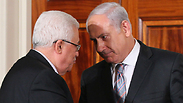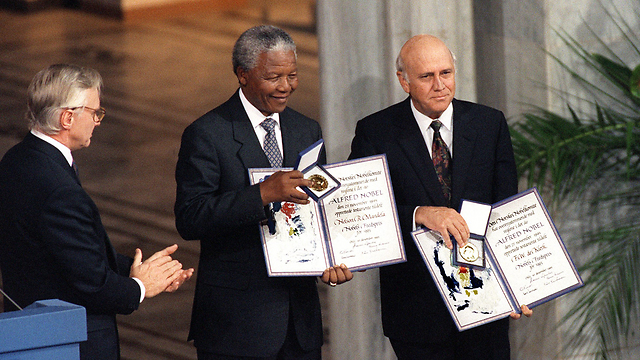
66-year-old state seeks real foreign policy
Op-ed: The erosion of Israel's international standing is an strategic threat being met by useless policy based on inaction, as though this were sustainable or beneficial to anyone.
The movement for a boycott of Israel gathered momentum, international political pressures intensified, and a Palestinian proposal at the UN Security Council to end the occupation within two years was only defeated by one vote – and that thanks to political pressure from the United States on Nigeria and Rwanda, two non-permanent members of the Security Council.
This continued erosion has led to genuine concern over the international standing of the State of Israel - and its legitimacy. This is a strategic threat, one that is being met by useless Israeli policy based on inaction, which is consecrated on the altar of the status quo, as though this were sustainable or beneficial to anyone.
A country with a desire for life cannot afford inaction and will pay the price in the form of international pressure. What is required is planning and preparation for a new path.

The late Hans Morgenthau, the leading realist theorist, spoke of the need for a purpose in foreign policy. Morgenthau did not define that purpose, but he referred to its existence or non-existence as a fact, from which one can learn through a careful examination of achievements and policy outcomes, achievements which together form a sequence that reveals a unique pattern linking the past, present and future.
This sequence is especially concerned with the subjugation of foreign policy for the sake of a normative system. The existence of the purpose transforms the said country into a model for other nations.
Values and interests are not in conflict
Like Morgenthau, contemporary liberal theorist Joseph Nye talks of soft power as an essential national resource, through which it affects other countries not by force or coercion, but by the attraction of its values and its status as a role model.
When (and only when) a state's international behavior is in sync with these values, and these values are also relevant to other countries, then the valuable resource of soft power becomes available. As long as the United States speaks on behalf of universal values and democratic principles and acts on their behalf, then it has soft power, but when it becomes publicly exposed that it has been betraying those values, this power is lost.
And through other theory we know that values and interests are not necessarily in conflict, but rather are mutually constructing each other, for example, through identity.
The question of who we are dictates our values and helps us to understand our interests and their interpretations. Consider a discussion on the place of Israel in the world, and whether it should attempt to integrate into the Middle East or Europe and the West. This is a discussion on the nature of a national interest, which cannot be disconnected from a discussion on our identity and values as Israelis. This is the case when it comes to a debate on the future of the occupied territories / West Bank / Judea and Samaria (note the historical and political baggage of each name), which is not "cold" security and cannot be separated from who we are as Israelis and our connection to this place and land. Values and interests are not in contradiction, but rather in tension, which yield its own rewards.
It follows, therefore, that the State of Israel should think about the purpose of its foreign policy, which is connected to global values, find a new path and save its eroded legitimacy.

It is up to the professionals of the Ministry of Foreign Affairs to lead the process of adopting and designing a purpose, via consultations with intellectuals from a variety of fields and sectors – Jews and non-Jews, Arabs, men and women, religious and secular, from the center and the periphery.
This is the process through which we look inside ourselves and refine one or two values that could be the new purpose of Israeli foreign policy. The government must hold a discussion on this purpose, and adopt it and lead Israel in accordance with it. Not as empty slogans or rhetoric disguised as advocacy, nor as an exercise in hypocrisy or a transparent evasion of responsibility and action.
Values, needs and beneficial knowledge
Here is an initial proposal for a possible purpose: Knowledge for the good. Knowledge has always been at the center of the Jewish experience, and it is no less important to the ethos of Israeli society and its various sectors. Knowledge is the mobilizing factor for progress in society, and we so much like to take pride in being a start-up superpower.
Israel needs a foreign policy based on a purpose that integrates values and needs, and better knowledge can fulfill this purpose, thereby generating a new policy framework. It comes from within us and radiates outwards, to the world; it reflects an inner world of values, but one that is relevant and projected to the world. It also connects us to the democratic states to which we aspire to belong.
Knowledge can be a vital lever for policy on regional aid, forming the basis for regional and global cooperation. It is clear that technological know-how is needed to in order to transform the vast natural resources in our region, including the gas reserves discovered off Israel's coast, into sources for well-being. Technological knowledge is also required in order to transform natural resources in environmentally friendly ways. Knowledge, then, is a major crossroads for cooperation that can drive the processes of conflict resolution.
But knowledge does not only mean better technical knowledge, but also as part of the social infrastructure, as fruit of the tree of knowledge of good and evil. A deep perception of knowledge such as this opposes its cynical use, as, for example, did the State of Israel with its aid policy for African countries in the 1960s. In that instance, technological, medical and defense know-how were mainly employed to strengthen ties with local elites. This short-term policy hurt national interests when the political elites were replaced with other elites, or when there was a broader regime change. Thus, cooperation with South Africa, based on tech knowledge and a convergence of interests, was transformed with the collapse of the Apartheid regime and became an albatross around the neck of the State of Israel.
Beneficial knowledge is therefore also good and evil knowledge, and understanding this stems from the fact that we are human beings with similar needs, and we all deserve recognition and respect. This is a moral perception of knowledge as inclusion not exclusion, and a lever to mutual respect rather than arrogance.
As such, beneficial knowledge should also form the basis of negotiations with the Palestinians, creating a dialogue based in honesty not hypocrisy, willingness not aggression; dialogue that strives for reconciliation and peace while securing the international legitimacy of the State of Israel for generations to come.
And another advantage: beneficial knowledge as a purpose of foreign policy will also compel us to return to ourselves and place education at our core, so that knowledge continues to define us, as well as our foreign policy.
Piki Ish-Shalom is the director of the Leonard Davis Institute for International relations and Associate Professor at the Department of International Relations, the Hebrew University of Jerusalem.










